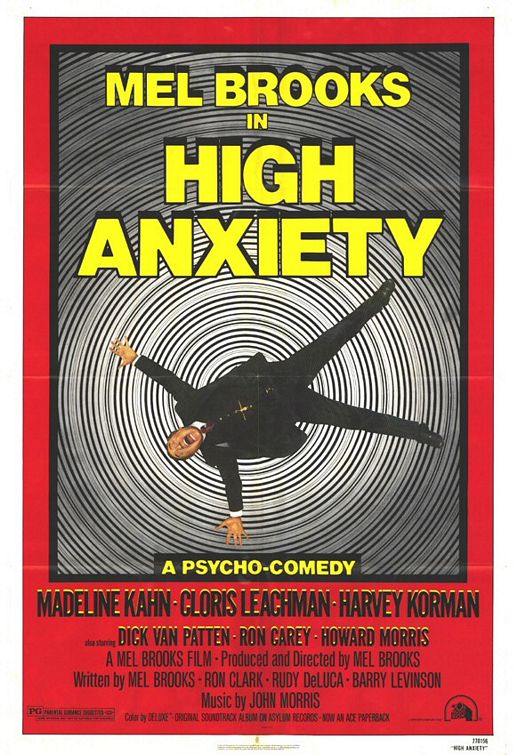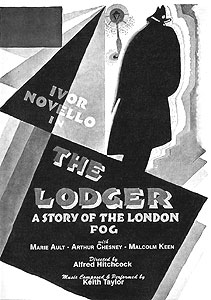1977
The United States of America

Dr. Charles Montague: Enjoy yourself, for God's sake! Get your mind off the Wentworth murder... Accident! Accident!
I'm not entirely sure how to begin this review for one of my favorite comedies. I suppose I could tell you that it is directed by one of the funniest men to ever sit in a director's chair, Mel Brooks, and that it is a parody of one of the greatest directors who ever lived, Alfred Hitchcock. But that wouldn't do it justice. Mel Brooks was more than just a director of funny films. In 1974, his one-two cinematic punch of Blazing Saddles and Young Frankenstein literally changed the way comedy was approached in the movie industry. His first film, The Producers, originated as a hit movie, morphed into a Broadway musical (which holds the record for the most Tony Award wins: 12), and then once again into another movie with the musical's cast! And let's not even get into Hitchcock. Anybody who has taken a casual look at the reviews in this site knows what my opinions are on the Master himself. So, I guess the best way to introduce this film would be to recite its tagline when it was first released: The Master of Comedy takes on The Master of Suspense!

And Brooks certainly is a master of comedy. I would also be so bold as to say that he is one of comedy's greatest auteurs. His style is simple: take a film genre, and parody every aspect of it. When an audience goes into a movie by Mel Brooks, they know exactly what they are going to see. Blazing Saddles, well, it is obviously a Western. Young Frankenstein, horror. Silent Movie, well...you get my point. Once Brooks has established his genre, he goes to work on it with a fervor. I have noticed that in several of his films, the plots are just a means for further satire. For example, I believe that the plot for High Anxiety was created for the sole purpose of including as many Hitchcockian set pieces as possible. You want to parody Vertigo, well, put the characters in a really tall hotel. You want to parody The Birds, place him in a park. You want an opportunity to investigate all the sick, demented, and deranged characters that populated Hitchcock's films, make the main character a psychologist.
And that is exactly what Brooks did. Brooks plays (in his first speaking role in one of his own movies) a Dr. Richard Thorndyke who travels to Los Angeles so he can become the new administrator of the Psychoneurotic Institute for the Very, Very Nervous. What luck! With an insane asylum as a setting, we can parody Spellbound! The institute needs a consultant, so make him a walking German stereotype like Professor Gustav Lindt from Torn Curtain. They have a session where Thorndyke is placed under hypnosis by Professor Lindt. A-ha! Now we can have a parody of The Ring by making Thorndyke get in a mental boxing match with Lindt while they pry into his subconscious. And let's not forget the great climax! A chase scene up an old tower! If you don't understand that reference, then you need to brush up on your Hitchcock. I think you can probably see what I am getting at concerning the logic behind Brooks' method.

But it works well. Of course, all the major Hitchcock films are gleefully skewered. Thorndyke is afraid of heights, he gets attacked by bird droppings, he even gets attacked by a frustrated bellhop delivering a newspaper while in the shower (with a delicious cameo by Barry Levinson, who would go on to direct The Rain Man)! But I find that this film is more than just a collection of satirical set pieces. It shows an endearing love Hitchcock. Not only are his movies parodied; Hitchcock's camera movements are mimicked, his musical scores quoted, and even the actors' performances are modeled after prominent characters from his movies. Many of the references are subtle. So subtle that they can be missed, or even outright ignored by audiences.
Take for instance, the scene where Nurse Diesel (a parody of Nurse Ratched from One Flew Over the Cuckoo's Nest) and Dr. Montague (played by Brooks regular Harvey Korman) sit at a table and have tea. They are the antagonists, and during this conversation they continue to scheme against the main characters. Brooks chose to shoot the scene from beneath the glass table that they were drinking at. However, Diesel and Montague keep putting down their cups and bowls directly on top of where the camera was positioned. Frustratingly, the camera moves a bit to the side for a better view of the actors. But it is to no avail. They put down the plates on top of it! This continues for the entire conversation as the schemers remain completely oblivious to the camera's struggles. A regular film goer would probably write this off as another Brooks joke, but it is in fact a reference to The Lodger: A Story of the London Fog (1927) the third movie that Hitchcock ever made!

How many people, even Hitchcock fans, can say that they have seen The Lodger: A Story of the London Fog, or even heard of it? Well, Brooks did. A real Hitchcock aficionado will be floored by all the subtle references hidden all throughout this movie. It proves that Brooks was willing to go to great lengths to prove his love for Hitchcock. And indeed, there is a great energy running all throughout the movie. I absolutely refuse to tell you anything more about the movie's plot, because to tell you anything could result in ruining one of Brooks' jokes. And that is what High Anxiety is: a joke, layered on top of a parody, and covered in satire.
But that leaves one important question: what did Hitchcock think of the movie? Well, Brooks gave Hitchcock a private preview of the film. After it was over, Hitchcock left without saying a word. The next morning, Brooks received a bottle of champagne from Hitchcock. He apparently knew that Brooks was a wine lover. Considering how Brooks had proved himself to be a man of subtle nuance, that was probably all the thanks that he could have ever wanted. I'll drink to that, too.
http://www.imdb.com/title/tt0076141/
http://en.wikipedia.org/wiki/High_Anxiety
LOL, you DO cater to your audience's suggestions, don't you? This is a good break from all the film noir and tragedy.
ReplyDeleteWell, any more suggestions would be greatly appreciated. I am a fan of all genres. So, whatever you may want, be it musical, grindhouse, or sci-fi, just ask me and I will try to comply. Ask me nicely enough, I may even delve into the depths of Bollywood.......
ReplyDeleteAs a fan of both Mel Brooks and Alfred Hitchcock, I enjoyed your HIGH ANXIETY review very much! While it may be best appreciated by die-hard Hitchcock aficionados like my family and me, it's done with great affection and the attention to detail of a true Hitchcock fan. Like all top-notch genre parodies, if you took all the jokes out of HIGH ANXIETY, it would still work as a solid suspense thriller. I'll admit that I think Gene Wilder would have been the perfect choice to play Dr. Richard H. (Harpo) Thorndyke, but Brooks is so irrepressable that he's irresistable, especially when he croons "High Anxiety" to Madeline Kahn, the most flaky yet adorable Hitchcockian blonde this side of Kim Novak! :-)
ReplyDeleteIndeed.
ReplyDeleteSomething that Brooks always understood was that you have to love the things that you parody. It reminds me of Ricky Gervais at the Golden Globes...he wasn't joking out of love or friendship...he was doing it just to insult and offend.
There's a vital difference.